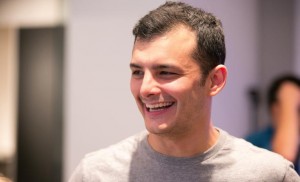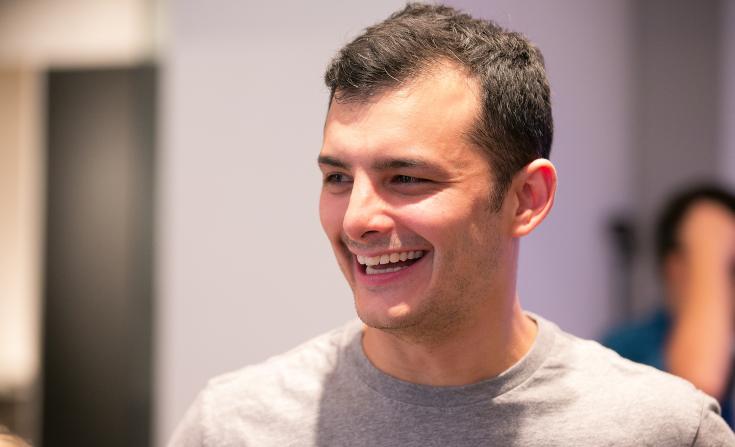This Q&A is an edited excerpt from a Sustainable Business Fridays conversation Sept. 26 by the Bard MBA in Sustainability program, based in New York City. This twice-monthly dial-in conversation features sustainability leaders from across the globe. Originally published on Friday February 20, 2015 as part of The Sustainable MBA series on www.greenbiz.com.
Derek Handley is an entrepreneur, author and investor embedding the B-Team‘s vision of people, planet and profit  into everything he does: the businesses he works with, the networks he’s involved with and in New Zealand, the country he calls home.
into everything he does: the businesses he works with, the networks he’s involved with and in New Zealand, the country he calls home.
He is The B Team’s entrepreneur-in-residence, an adjunct executive professor at AUT University, chair and co-founder of NZX-listed Snakk Media, a director at Sky Television, a New Zealand Arts Foundation trustee and an astronaut-in-waiting at Virgin Galactic.
Bard MBA: What led you to join the movement of redefining business for both society and the planet?
Derek Handley: In 2010 I was starting to think about my next move and realized I didn’t know anything about sustainable business, sustainable capitalism, ethical capitalism, compassionate capitalism, social entrepreneurship — whatever you want to call it.
I realized I didn’t know anything about the frontier of what I believed would be the remodeling of business, the remodeling of capitalism that this generation and this century will eventually be responsible for. So I decided that I would donate a year of my life in 2012 to any combination of organizations that could help me learn. I would give my time, my entrepreneurship abilities, my marketing and digital-media understanding to any non-profit or university or idea that could put me in a place to be exposed to the best thinkers in the world on everything from microfinance to impact investing to sustainable strategies to environmental strategies.
I didn’t really know what it was going to be. I just decided that it was going to be a year of time, kind of like an MBA, to go and start a new business that modeled as many of those things that I learned about.
Bard MBA: How was the B Team created?
Handley: After selling my previous business, one of the first things I did was buy a ticket to space with Virgin Galactic. As a result, I met its founder, Richard Branson. I told Richard my story and intentions for 2012. He said that there are a number of people around the world who think the same way.
We’re not quite sure about how we’re going to get there. “But what I would like to do,” he said, “is collect a group of them from all around the world who may not know each other, who may not realize that they are all trying to achieve and accelerate a similar vision of the role of business in society, and create a team. And get them to work together and get them to aspire to elevate this message and make it part of the zeitgeist, and convince more and more business leaders to see things the same way.”
In addition, maybe that team can start to work together on the initiatives each of them is doing. Not only act as a united front from a public standpoint, but also in their own businesses and in their own lives, help each other achieve more than they could if they were alone.
So that was all over a game of pool. I told him if he needed anyone to create that organization that I had a year to give and that he could have some or all of it. By the end of that evening, we agreed that by February 2012 I would start and create with him and many others what is now known as the B Team.
Bard MBA: What is the B Team and their role in the world?
Handley: The B Team’s role in the world is to catalyze a better way of doing business for the well-being of people and the planet. Not at the expense entirely of profit, but integrating a new model that understands that all three of them are reliant on each other.
The moniker under which it’s named after is for a Plan B. Basically, a Plan B for how we run businesses. Plan A is what is currently driving us into the ground and also isn’t being used to solve social and environmental issues that we need to figure out in the next 20-30 years. There are so many cyclical and systemic problems with the way we do things today that there is more than enough to work on.
Bard MBA: Who is the B Team?
Handley: Sixteen leaders from around the world. Most of them business people. Some of them are hybrids like Muhammad Yunis, who is known as the father of microfinance and now known as the father of social business. His definition of a social business is a business that works purely to solve a social problem and is a non-dividend-paying entity.
So you can put capital into it to fund the business, it has a business model to solve a problem that would normally be ascribed to charity or government, and it uses all its profits after it has returned the original capital towards scaling the solution to the problem.
Zhang Yue is from China. He started off in boilers, ended up in air conditioning and now has moved on to construction. In the air-conditioning industry, he revolutionized energy efficiency and started to rethink how buildings are built. He totally redesigned how to build skyscrapers offsite, with bringing it to the construction site and putting it together like a Lego set. Those buildings are five times more efficient than the average building. They only produce 25 tons vs. 3,000 tons of construction waste on site, and they use no water while another building would use 5,000 tons of water on site to build.
Another B-Team member is Arianna Huffington, who is currently on a mission around the world. She launched a book called “Thrive” around the role of business driving well-being in the workplace.
There’s a whole set of different individuals who have allocated different work streams they are looking at. Our website spells out our agenda — the key areas of business that we fundamentally believe need to change. The challenges that the B Team is working on at the moment include the future bottom line, future incentives, future leadership and future investment.
Bard MBA: What is the unique role the B Team sees itself playing?
Handley: People didn’t join as companies. They joined as individuals who believe in a cause. It’s not a traditional membership organization. It’s a global leadership collective in this space — each person is well known in his/her own country — a collection of national icons who are global players.
As it grows, it will start to look at how to create more of a movement that can expand and include thousands more.
